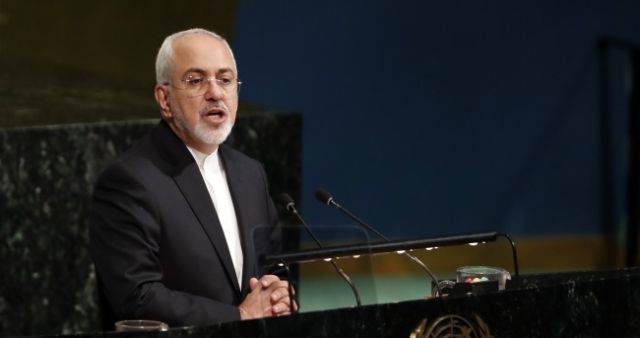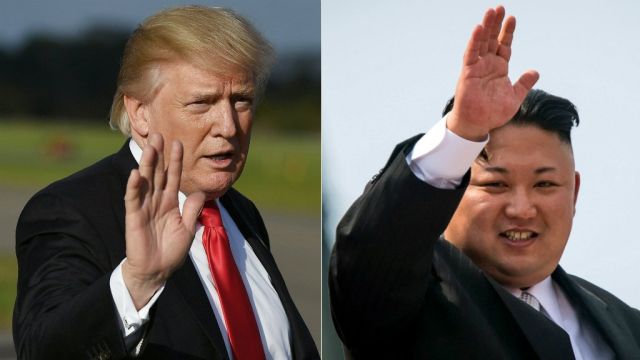
by admin | May 25, 2021 | World
 By Barry Ellsworth,
By Barry Ellsworth,
Trenton, Canada: The U.S. floated the idea Tuesday of separate trade talks with Mexico and Canada rather than a new North American Free Trade Agreement (NAFTA) with the three countries as signatories.
But Canada’s reaction was to immediately dismiss the suggestion.
“As Canada has maintained right from the beginning, we believe in a trilateral NAFTA, we believe that together it’s been a win-win-win for our three economies and all three nations have prospered,” said Andrew Leslie, the parliamentary secretary to the foreign affairs minister in charge of Canada-U.S. relations.
Trade between the three nations totaled about US$1.1 trillion in 2016, about three-and-a-half times that of the first year of the deal in 1994.
Renegotiations on a new NAFTA have been underway since August 2017 and have stalled primarily due to U.S. insistence on a high percentage of American parts used in vehicles made in all three countries. Even if that impasse is overcome, the U.S. also wants a sunset clause that would see the deal renegotiated every five years, something both Canada and Mexico have balked at because they believe it would create an uncertain investment climate.
Larry Kudlow, U.S. President Donald Trump’s economic advisor, said the president is “very seriously contemplating a shift in NAFTA negotiations”.
“His preference now — and he asked me to convey this — is to actually negotiate with Mexico and Canada separately,” Kudlow told Fox News on Tuesday.
He said he conveyed that message on Monday to an official close to Canadian Prime Minister Justin Trudeau.
To date, there has been no official public statement from Trudeau.
Kudlow said Trump is not going to walk away from NAFTA negotiations but was interested in a new approach that could include bilateral talks.
—AA

by admin | May 25, 2021 | Commodities, Commodities News, Corporate, Corporate Governance
 New Delhi : The US is among G7 countries ranked lowest due to its continued support for fossil fuel exploration and production, as well as backtracking on previous pledges to end support to fossil fuels, new research has found.
New Delhi : The US is among G7 countries ranked lowest due to its continued support for fossil fuel exploration and production, as well as backtracking on previous pledges to end support to fossil fuels, new research has found.
It said Group of Seven (G7) governments continue to provide at least $100 billion each year to support the production and consumption of oil, gas and coal despite repeated pledges to end fossil fuel subsidies by 2025.
In a major study, published ahead of the G7 Summit in Canada, researchers from the Overseas Development Institute (ODI), Oil Change International (OCI), the International Institute for Sustainable Development (IISD), and the Natural Resources Defense Council (NRDC) have for the first time ranked each G7 country on their transparency, commitments and progress made on ending support for the production and use of oil, gas and coal.
The G7 2018 Summit will be held in Charlevoix, Quebec, from June 8 to 9.
France was the highest ranked country, due to its progress in phasing out support to fossil fuel production and power.
Canada, which holds the G7 presidency this year, scored highly on ending support to coal mining, fossil fuel-based power and fossil fuel use, but had the worst ranking on support for oil and gas production.
Britain scored lowest on transparency, with the government denying it provides any fossil fuel subsidies, under its own definition, despite making commitments to end subsidies.
Overall, the paper finds G7 governments are still dedicating vast public resources to finding, extracting and using fossil fuels, and are at serious risk of not delivering their commitment to phase-out subsidies by 2025.
“Despite repeated pledges to eliminate fossil fuel subsides G7 countries are continuing to subsidise oil, gas and coal, fuelling dangerous climate change with tax-payers’ money,” said lead author Shelagh Whitley, head of the Climate and Energy Programme at ODI.
“This scorecard addresses the current gap in accountability and, for the first time, tracks progress by each of the G7 countries in phasing out fossil fuel subsidies. While some progress has been made in recent years, overall it is a grim picture with not one country scoring highly.”
Report co-author Alex Doukas, Stop Funding Fossils Program Director at OCI, said: “Last December, the World Bank committed to ending its finance for oil and gas extraction. The G7 governments need to follow suit and rapidly phase out their public finance for oil, gas and coal projects around the world.”
To meet their 2025 deadline, researchers have called on the G7 to publish comprehensive fossil fuel subsidy peer-reviews no later than 2019 and establish country-level plans for phasing out fossil fuel subsidies, starting with subsidies that have negative social and environmental impacts.
—IANS

by admin | May 25, 2021 | Muslim World

Mohammad Javad Zarif
Tehran : Iran’s Foreign Minister Mohammad Javad Zarif has urged international condemnation of US attitude towards Iran’s 2015 landmark nuclear deal, the media reported.
In letters to his counterparts of a number of countries, Zarif on Sunday warned of the dangerous consequences of the US “illegal and unilateral” move to pull out of the nuclear agreement, officially known as the Joint Comprehensive Plan of Action (JCPOA), Xinhua reported citing Press TV.
He called for international condemnation of what he called Washington’s “extremism,” urging the world to withstand US “lawbreaking and bullying behavior.”
“Illegal withdrawal of the US government from the JCPOA… is challenging the goals and principles of the Charter of the United Nations and the efficiency of international bodies,” the Iranian Foreign Minister said.
Likewise, the US withdrawal from the JCPOA was the country’s biggest effort aimed at violating and weakening the nuclear accord and the UN Resolution 2231, adopted in July 2015 to endorse the historic deal, he said.
Zarif further said the JCPOA put an end to an “unnecessary crisis” which lasted for more than one decade.
He emphasized that the agreement’s scope, regulations and time frame were the outcome of “accurate, sensitive and balanced multilateral” talks and it is impossible to make any changes on or hold new negotiations about them.
US President Donald Trump announced on May 8 to pull out of the treaty, and vowed to re-impose sanctions on Iran, which was alleviated under the JCPOA.
Iran has said that it will stay in the deal as long as the other five powers remain committed to it despite the US pullout.
—IANS

by admin | May 25, 2021 | Business Summit, Events, Social Round-up, World
 By Arul Louis,
By Arul Louis,
New York : US President Donald Trump is proposing phased negotiations with North Korean leader Kim Jong-un, starting with the planned June 12 summit in Singapore during which he does not expect a complete deal on denuclearisation.
At the same time, Trump has also set an ambitious goal for his interactions with Kim aiming for an end to the official 70-year state of war between the US and North Korea.
After a meeting Kim Yong-chol, the North Korean leader’s emissary, in Washington on Friday, Trump confirmed that the Singapore summit he had canceled last week was back on track.
“I think we’re going to have a relationship, and it will start on June 12th,” the President said.
Kim Yong-chol traveled to Washington after two days of negotiations with Secretary of State Mike Pompeo in New York to hand over a letter from Kim Jong-un to Trump.
Trump said that “it ended up being a two-hour conversation with the second most powerful man in North Korea” during which they discussed a whole range of subjects.
Tamping down hopes of an imminent breakthrough, Trump said: “We’re not going to go in and sign something on June 12th and we never were. We’re going to start a process. And I told them today, ‘Take your time. We can go fast. We can go slowly’. But I think they’d like to see something happen.
“You’re talking about years of hostility; years of problems; years of, really, hatred between so many different nations. But I think you’re going to have a very positive result in the end.”
As a goodwill gesture, Trump said that he will not be putting any more sanctions on North Korea, but the existing ones will continue.
Pompeo, however, has asserted that the US won’t budge from the ultimate goal of denuclearising North Korea.
“I have been very clear that President Trump and the United States objective is very consistent and well known: the complete, verifiable, and irreversible denuclearisation of the Korean Peninsula,” he sad on Thursday.
North Korea poses a major threat with the nuclear devices as well as missiles capable of reaching the US mainland that it has developed.
After it tested them last year, the two leaders traded threats and abuses, while the US succeeded in tightening the UN sanctions on North Korea.
Later this year they cooled down and agreed to talk.
While preparations were going on for the talks, there was a burst of “tremendous anger and open hostility” coming out of Pyongyang last month, which Trump cited to call off the talks.
They were provoked by comments from Trump’s new National Security Adviser John Bolton and Vice President Mike Pence invoking a “Libyan model” for dealing with North Korea.
It upset Pyongyang because after Libyan leader Muammar Gaddafi shutdown his nuclear programme in 2003 after which he was overthrown and killed in 2011 following attacks by US and its European allies.
Bolton and Pence have been sidelined and Pompeo, whom Trump has praised for negotiating with North Korea, has taken centre stage.
While Trump would score points internationally and domestically by pulling off the summit and soften his hardline image by having the summit, Kim Jong-un appears to be equally invested in the denuclearisation talks that could translate to economic development for his impoverished country that is under severe economic sanctions.
Trump said that if the nuclear issue is resolved, he expected South Korea, Japan and China to provide aid to North Korea, without any cost to the US for rebuilding it.
Trump said that during the meeting with Kim Yong-chol they talked about ending the Korean War which continues formally.
“And there is a possibility of something like that,” he added.
(Arul Louis can be reached at arul.l@ians.in)
—IANS

by admin | May 25, 2021 | World
 Washington : US President Donald Trump on Wednesday signed a new bill titled “Right to Try” which allows terminally ill patients to seek drugs that are still experimental and not fully approved by the US Food and Drug Administration.
Washington : US President Donald Trump on Wednesday signed a new bill titled “Right to Try” which allows terminally ill patients to seek drugs that are still experimental and not fully approved by the US Food and Drug Administration.
“As I proudly sign this bill, thousands of terminally ill Americans will have the help, the hope and the fighting chance — and I think it’s going to be better than chance — that they will be cured, that they will be helped, that they will be able to be with their families for a long time, or maybe just for a longer time,” Trump said, Xinhua reported.
Under the legislation, patients who are near death, or who have a disease that is likely to lead to severely premature death, have the right to seek drug treatments that remain in clinical trials after passing phase 1 of the FDA approval process.
The House on Tuesday voted 250-169 in favour of the bill, which the Senate passed in August.
Advocates for the bill say it opens a door for terminally ill people in states that haven’t passed such a law. Critics argue that the legislation disempowers the FDA and won’t make it easier for the patients to access these drugs, local media reported.
“This issue is about real people who are terminally ill, facing the end of the line, and want to have one more shot at life,” said Starlee Coleman with the Goldwater Institute, a conservative public policy think tank based in Phoenix that supports right-to-try legislation.
Right-to-try laws exist in 40 of US 50 states. With the new federal legislation, Coleman argues, patients in states without these laws could save time accessing experimental treatments by eliminating FDA application requirements.
Opponents of the bill, including over 100 patient and provider advocacy groups, say it won’t have a major impact on accessing treatments; on the contrary, it could have a detrimental effect on how the FDA safeguards people’s health.
It is unclear how many Americans have taken advantage of right-to-try laws because the vast majority of states do not have central reporting requirements, said local media reports, noting that there’s no guarantee that insurance companies would pay for these treatments.
—IANS






